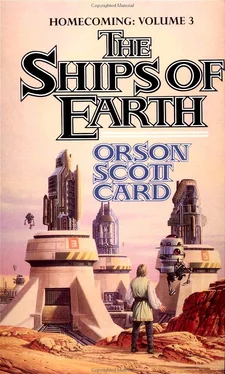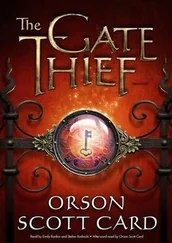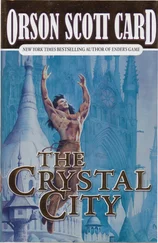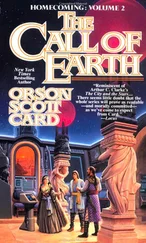Orson Card - THE SHIPS OF EARTH
Здесь есть возможность читать онлайн «Orson Card - THE SHIPS OF EARTH» весь текст электронной книги совершенно бесплатно (целиком полную версию без сокращений). В некоторых случаях можно слушать аудио, скачать через торрент в формате fb2 и присутствует краткое содержание. Жанр: Фантастика и фэнтези, на английском языке. Описание произведения, (предисловие) а так же отзывы посетителей доступны на портале библиотеки ЛибКат.
- Название:THE SHIPS OF EARTH
- Автор:
- Жанр:
- Год:неизвестен
- ISBN:нет данных
- Рейтинг книги:4 / 5. Голосов: 1
-
Избранное:Добавить в избранное
- Отзывы:
-
Ваша оценка:
- 80
- 1
- 2
- 3
- 4
- 5
THE SHIPS OF EARTH: краткое содержание, описание и аннотация
Предлагаем к чтению аннотацию, описание, краткое содержание или предисловие (зависит от того, что написал сам автор книги «THE SHIPS OF EARTH»). Если вы не нашли необходимую информацию о книге — напишите в комментариях, мы постараемся отыскать её.
THE SHIPS OF EARTH — читать онлайн бесплатно полную книгу (весь текст) целиком
Ниже представлен текст книги, разбитый по страницам. Система сохранения места последней прочитанной страницы, позволяет с удобством читать онлайн бесплатно книгу «THE SHIPS OF EARTH», без необходимости каждый раз заново искать на чём Вы остановились. Поставьте закладку, и сможете в любой момент перейти на страницу, на которой закончили чтение.
Интервал:
Закладка:
Of course, at times of struggle Chveya would join with the older girls in alternately sneering at and snubbing the rebel boys, but in her heart Chveya longed to be part of Proya's kingdom. They were the ones who played rough and wonderful games involving hunting and death. She would even act the deer if they would only invite her to play, letting them hunt her and shoot at her with their blunt-tipped arrows, if only she could be part of them instead of being miserably trapped in Dazya's demesne. But when she hinted at this desire to her brother Zhyat, he made a great show of gagging and retching and she gave up the idea.
Her greatest envy was reserved for Okya and Yaya, the two sons of Grandmother and Grandfather. Okya was First Boy and Yaya was Fourth Boy. They could easily have dislodged Proya from his position of seniority among the boys, especially because the two brothers did everything together and could have thrashed all the other boys into submission. But they never bothered, only joining in Proya's games when they felt like it, and giving no concern at all to who was in charge. For they fancied themselves to be adults, not children at all. "We are of the same generation as your parents," Yaya had once said to her, quite haughtily. Chveya had thereupon pointed out that Yaya was considerably shorter than her and still had a teeny-weeny hooy like a hare, which caused the other children to laugh in spite of their awe for Yaya. Yaya, for his part, only looked at her with withering disdain and walked away. But Chveya noticed that he also stopped peeing in front of the other children.
When Chveya was brutally honest with herself, she had to admit that the reason she was so often completely isolated from the other children was because she simply could not keep her mouth shut. If she saw someone being a bully or unfair or selfish, she said so. Never mind that she also spoke up when somebody was noble or good or kind—praise was quickly forgotten, while offenses were treasured forever. Thus Chveya had no real friends among the other children—they were all too busy making sweet with Dazya or Proya to give real friendship to Chveya, except Okya and Yaya, of course, who were even more aloof and involved with each other in their supposed adultness.
It was when Chveya turned eight years old and saw how little heed anyone but her own parents paid to her birthday, after the enormous fuss made over Dazya's birthday, that she entirely despaired of ever being a person of significance in the world. Wasn't it bad enough that Dazya lorded it over everybody so outrageously as it was—why did the adults have to make a festival out of Dazya's birthday? Father explained, of course, that the festival wasn't about Dza herself, but rather because her birthday marked the beginning of their whole generation of children—but what did it matter if the adults thought of it that way or not? The fact remained that with this festival they had affirmed Dazya's iron rule over the other children, and in fact had even given her a temporary ascendancy over Proya himself, and Okya and Yaya had sulked through the whole party when they were snubbed and lumped in among the children, which they felt was wrong since they were not part of the younger generation. How could the adults so heedlessly and destructively have intervened in the children's hierarchy? It was as if the adults did not think of the children's lives as real.
It was then that Chveya reached her profound insight that the adult world and the children's world were probably identical in the way they worked, except that the children were perpetually subservient to the adults. It began in a conversation with her mother as she combed Chveya's hair after her bath. "The younger boys are, the more disgusting they are," Chveya said, thinking of her second brother Motya, who had just discovered how much tumult he could cause by picking his nose and wiping it on his sisters' clothing, a practice which Chveya had no intention of tolerating, whether he did it to her or to little Zuya, who couldn't defend herself.
"That's not necessarily true," said Mother. "They simply find different ways of being disgusting when they get older."
Mother said it offhandedly, like a joke, but to Chveya it was a grand illuminating moment. She tried to picture Krassya's father, Obring, for instance, picking his nose and wiping it on Mother, and knew that it could never happen. But perhaps there were other disgusting things, adult things, that Obring might do. I must watch him and find out, thought Chveya.
She didn't question that it was Obring she should watch—she had often seen the way Mother grew impatient when Obring spoke in council meetings. She had no respect for him, and neither did Father, though he hid it better. So if any adult male might exemplify disgusting behavior, it would certainly be Obring.
From now on, Chveya would focus all her attention on the adults around her, watching to see who was the Dazya of the mothers and who was the Proya of the fathers. In the process, she began to understand things that she had never understood before. The world was not as clear and simple a place as she had thought till now.
The most shocking revelation came on the day she discussed marriage with her parents. It had recently dawned on her that eventually the children would all grow up and pair off with each other and have babies and start the whole cycle all over again—this because of some vile remark by Toya about what Proya really wanted to do to Dazya. Toya had meant it to be an obscene horror, but Chveya realized that, far from being a horror, it was probably a prophecy. Wouldn't Proya and Dazya be the perfect pair? Proya would be just like Elemak, and Dazya would probably smile at Proya with complete devotion the way Eiadh did with Elemak. Or would Dazya be like her mother Hushidh, so much stronger than her husband Issib that she even carried him around and bathed him like a baby? Or would Proya and Dazya continue their struggle for supremacy all through their lives, trying to turn their own babies against each other?
That thought led Chveya to wonder which of the boys she would marry. Would it be one of the boys of the first year, her own age? That would mean either Proya or Okya, and the thought of either one repelled her. Then what about boys of the second year? Dazya's little brother Xodhya, Proya's little brother Nadya, or the "adult" Yaya—what a proud selection! And the children of the third year were the same age as her revolting brother Motya—how could she dream of marrying someone that young?
So she broached the subject with her parents as they were eating breakfast on a morning when Father was not going hunting, so they could eat together. "Will I have to marry Xodhya, do you think?" she asked—for she had decided that Xodhya was the least disgusting of all the alternatives.
"Definitely not," said Mother, without a moment's hesitation.
"In fact," said Father, "we would forbid it."
"Well, who then? Okya? Yaya?"
"Almost as bad," said Father. "What is this, are you planning to start a family anytime soon?"
"Of course she's thinking about it, Nyef," said Mother. "Girls think about such things at this age."
"Well, then, she might keep in mind that she isn't going to marry a full uncle and certainly not a full double first cousin."
These words meant absolutely nothing to Chveya, but they hinted at dark mysteries. What unspeakable thing had Xodhya done to become a "full double first cousin"? So she asked.
"It's not what he did," said Mother. "It's just that his mother, Hushidh, is my full sister—we both have the same mother and the same father. And Zaxodh's father, Issib, is your father's full brother—they both have the same mother and father, who happen to be Grandmother and Grandfather. That means that you have all your ancestors in common—it's the closest blood relation among all the children, and marriage between you is out of the question."
Читать дальшеИнтервал:
Закладка:
Похожие книги на «THE SHIPS OF EARTH»
Представляем Вашему вниманию похожие книги на «THE SHIPS OF EARTH» списком для выбора. Мы отобрали схожую по названию и смыслу литературу в надежде предоставить читателям больше вариантов отыскать новые, интересные, ещё непрочитанные произведения.
Обсуждение, отзывы о книге «THE SHIPS OF EARTH» и просто собственные мнения читателей. Оставьте ваши комментарии, напишите, что Вы думаете о произведении, его смысле или главных героях. Укажите что конкретно понравилось, а что нет, и почему Вы так считаете.









